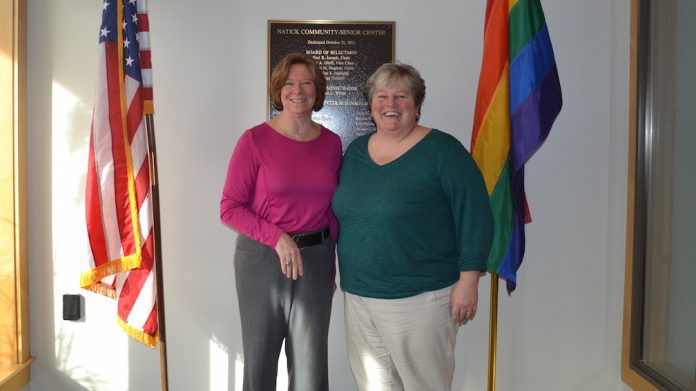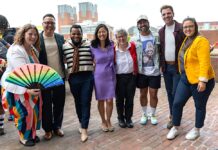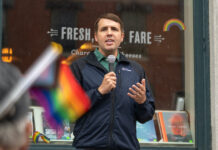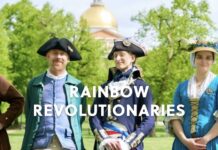[This story appeared in the January/February issue of Boston Spirit magazine. Subscribe for free today.]
The small movement started with the purest of intents. Susan Ramsey, director of the Natick Senior Center, wanted to begin the work to become more welcoming and inclusive to populations she felt were not attending the center, including LGBT older adults. Thus began a process of LGBT cultural competency trainings for the center’s staff conducted by The LGBT Aging Project at Fenway Health.
Ramsey learned in the trainings about the importance of a clear and unmistakable message of welcoming and inclusion. This would be critical to reach out to LGBT older adults who have never felt comfortable in mainstream senior centers for fear of discrimination or harassment. She also wrote a diversity statement, which the center adopted. But Ramsey felt that she needed a more visible symbol to convey her desire to be truly welcoming and inclusive.
So Ramsey purchased a rainbow flag for the center’s first community event for LGBT older adults and friends back in fall 2016.
At the same time that the center was ordering its rainbow flag, the town of Natick was rocked by an act of hatred and vandalism that involved another rainbow flag. Lauri Ryding and her wife Carrie purchased a rainbow peace flag in the wake of the tragic shooting at the Pulse night club in Orlando. Like many, the couple had been devastated by this attack and they wanted to honor the 49 victims. But when they returned home after a vacation, they found their house had been pelted with dozens of eggs and their rainbow flag had been stolen. Word quickly spread in this close-knit neighborhood and within days, 62 of the 88 houses had rainbow flags hanging in solidarity. This soon spread to other neighborhoods in the town, and the couple’s story became national news.
The running joke in the area was that there were more rainbow flags in Natick Massachusetts than there were in San Francisco.
When Ramsey and her staff learned about this incident they invited the Rydings to their community-wide event on LGBT aging. The event was a huge success that drew older adults, providers and allies from across the Metro West area, and the rainbow flag stood proudly at the door to welcome everyone into the center. Lauri Ryding, who is not a senior, was incredibly moved to learn about the issues LGBT elders were facing and made a commitment right then and there to help in whatever way she could.
After the flag’s debut at the community gathering, the plan was to put it back up for LGBT events at the center and also through June for Pride month. But something about that bothered Ramsey. She felt that it sent the wrong message to LGBT seniors—that they were only welcome during those times. Ramsey wanted the center to be welcoming to them all the time.
So the decision was made to make the flag a permanent fixture in the entry way of the senior center, where it remained for several months without issue. During that time a number of people went out of their way to thank Ramsey for the flag and tell her they had children or other family members who were part of the LGBT community.
Everything changed when a retired Marine who had served in the Korean War raised objections. Hed argued that it was unlawful to any group’s flag displayed in a municipal building. When he was told the reason for the flag, he said it was unnecessary because the American flag stood as a universal symbol to welcome everyone. This veteran, a respected member of the community, raised his objections appropriately through the town council, which prompted an investigation to determine the legality of not only flying the rainbow flag at the senior center but also including any images of the rainbow flag on materials for the center including their newsletter and event flyers.
Forced to seek legal counsel over months preparing her case, Ramsey reached out to groups like GLAAD and Lambda Legal. Seeking a precedent, she searched all over the country for a rainbow flag permanently installed at a municipal building. She came up empty-handed. Dozens of places displayed rainbow stickers or graphics but any place that flew the rainbow flag only did so for certain events or during Pride month. Because this issue was being tried as a First Amendment issue, Ramsey and her staff were concerned that the use of anything with the rainbow symbol on town property could banned.
Ramsey was left with only one option. She provided the municipal attorneys with all the documentation that supported her staff’s efforts to make the Natick Senior Center welcoming and inclusive for all people. She underscored that the flag was nothing more than a symbol of those efforts. Then she waited for their decision.
In September 2017 the attorney for the city of Natick released his finding, which clearly stated that the display of the rainbow flag or rainbow symbols at the senior center was not a violation of the First Amendment of the U.S. Constitution.
The flag could stay.
Thanks to Ramsey’s efforts, a group for older LGBT adults, friends and allies has formed at the Natick Senior Center and meets bimonthly for coffee and conversation. Now everyone who enters the Senior Center walks through the vestibule past the rainbow flag on the right and the American flag on the left. There is also another change at the center. Ramsey now has a new assistant program director for diversity and inclusion—Lauri Ryding.
To learn more about the LGBT events at the Natick Senior Center contact Lauri Ryding at lryding@natickma.org. [x]
Bob Linscott is assistant director of the LGBT Aging Project at Fenway Health.









